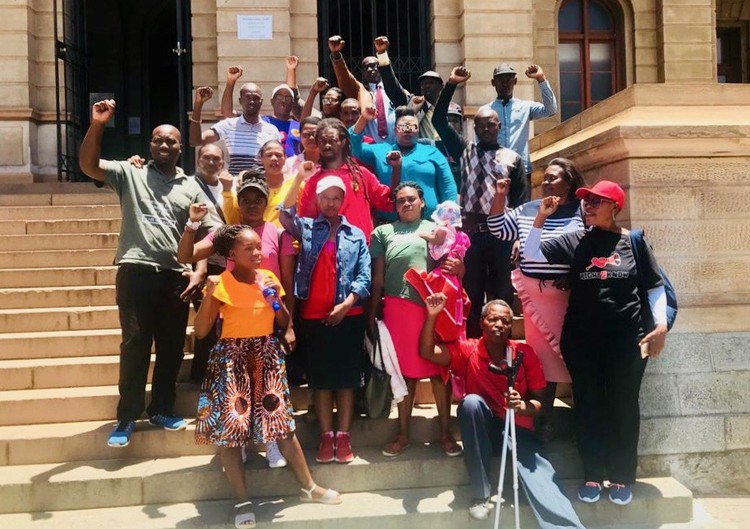
Marievale residents have repeatedly taken the South African National Defence Force (SANDF) to court after they were unlawfully evicted by the army. Photo: Kimberly Mutandiro
3 December 2018
On Friday, the Pretoria High Court reaffirmed its previous order that 355 people evicted without due process a year ago by the South African National Defence Force (SANDF) from its Marievale base in Gauteng be accommodated by the army.
The evictees (the applicants in the case), assisted by Lawyers for Human Rights (LHR), had hoped that the court would find that the SANDF, Minister of Defence, and senior military officers (the respondents in the case) were in contempt of court for failing to comply with a previous court order (made on 9 May) to provide them with accommodation.
However, Judge Norman Davis said, “I am not prepared to find that the minister, the general or colonel were even on a balance of probabilities in willful and mala fide disregard of the court order.”
Davis noted that the Department of Defence had publicly stated it would comply with the order; had issued instructions to “come up with options”; and had spent over R1.1 million in unbudgeted expense to refurbish two bungalows (old army barracks) as alternative accommodation. But Davis said the bungalows were inadequate and it was unacceptable to segregate the families by gender as the SANDF had insisted.
To date the residents, now living in shacks, have not been accommodated, nor has the SANDF initiated or finalised any legal process for the evictions that took place. Davis said the blame for this falls on the shoulders of the respondents.
But Davis went on to supplement the court order of 9 May by directing that the applicants supply the respondents with the full particulars and ID numbers of the residents who wish to return to the Marievale military base. Colonel Mafihlwase Mkhize was ordered to provide within five days a list of houses available for re-accommodaton; within 15 days to partition the bungalows into family units to allow for occupation by the applicants; and within 60 days to ensure that those who remained unaccommodated be provided with alternative temporary accommodation with cooking and washing facilities.
30 November marked a year since the Marievale residents were forcefully evicted from their homes by the SANDF. Many left the military base while others built shacks and formed the informal settlement of Happiness Village. Residents of the informal settlement say they have suffered intimidation by soldiers.
On 9 May, the court ordered that the army stop the intimidation and allow the evictees to return to their homes within 30 days or provide them with alternative accommodation if their houses had been occupied by the military.
The Marievale residents were back in court on 9 October saying the SANDF had continued to intimidate them and their water supply had been cut. The court ruled that water be restored and residents were not to be intimidated.
On 21 November, residents told the court of continued intimidation and asked for the SANDF to be found in contempt of court for not providing them with accommodation.
On Friday, Marievale residents said that although they were happy about the court order, they had expected re-occupation to be sooner.
Bongiwe Nkosi said she had hoped the court would order the SANDF to allow them back on the base within 24 hours.
Silvia Nontyi said, “l am prepared to move back to the base today because tomorrow [1 December] my landlord will expect me to pay rent in Duduza where we are staying. I do not work and l had to spend all of my children’s grants on rent. We do not even have food as we speak.”
Zodwa Matlaisane said she wished the soldiers would vacate the base so that the Marievale people could live as civilians. “As far as l am concerned that is my home. Soldiers should not share the place with us because they proved that they cannot live with us. Instead of protecting us – as their code of conduct states – they traumatised us.”
Thandeka Chauke of LHR said the contempt aspect of the judgment was disappointing. “While the judgment confirms that there was no compliance with the court order, there was no finding of willful or mala fide contempt against the Minister and the army generals. It is concerning that the contempt of court orders particularly by the state and state officials have become increasingly common. It is also unfortunate that it had to be spelt out by the court for SANDF to understand what they were initially supposed to do.”
Happiness Village, where families evicted from the Marievale military base have relocated and built shacks. Photo: Kimberly Mutandiro